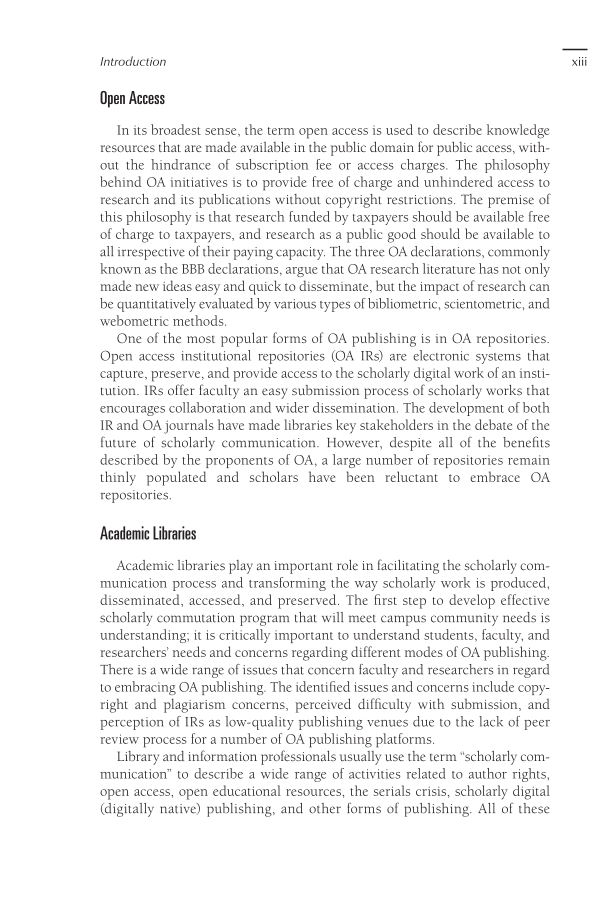Introduction xiii Open Access In its broadest sense, the term open access is used to describe knowledge resources that are made available in the public domain for public access, with- out the hindrance of subscription fee or access charges. The philosophy behind OA initiatives is to provide free of charge and unhindered access to research and its publications without copyright restrictions. The premise of this philosophy is that research funded by taxpayers should be available free of charge to taxpayers, and research as a public good should be available to all irrespective of their paying capacity. The three OA declarations, commonly known as the BBB declarations, argue that OA research liter a ture has not only made new ideas easy and quick to disseminate, but the impact of research can be quantitatively evaluated by various types of bibliometric, scientometric, and webometric methods. One of the most popular forms of OA publishing is in OA repositories. Open access institutional repositories (OA IRs) are electronic systems that capture, preserve, and provide access to the scholarly digital work of an insti- tution. IRs offer faculty an easy submission process of scholarly works that encourages collaboration and wider dissemination. The development of both and OA journals have made libraries key stakeholders in the debate of the IR future of scholarly communication. However, despite all of the benefits described by the proponents of OA, a large number of repositories remain thinly populated and scholars have been reluctant to embrace OA repositories. Academic Libraries Academic libraries play an important role in facilitating the scholarly com- munication process and transforming the way scholarly work is produced, disseminated, accessed, and preserved. The first step to develop effective scholarly commutation program that will meet campus community needs is understanding it is critically important to understand students, faculty, and researchers’ needs and concerns regarding different modes of OA publishing. There is a wide range of issues that concern faculty and researchers in regard to embracing OA publishing. The identified issues and concerns include copy- right and plagiarism concerns, perceived difficulty with submission, and perception of IRs as low-quality publishing venues due to the lack of peer review process for a number of OA publishing platforms. Library and information professionals usually use the term “scholarly com- munication” to describe a wide range of activities related to author rights, open access, open educational resources, the serials crisis, scholarly digital (digitally native) publishing, and other forms of publishing. All of these
Document Details My Account Print multiple pages
Print
You have printed 0 times in the last 24 hours.
Your print count will reset on at .
You may print 0 more time(s) before then.
You may print a maximum of 0 pages at a time.





















































































































































































